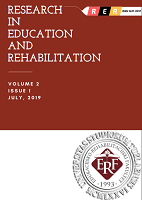DIFFERENCES IN THE FUNCTIONING OF FAMILIES OF CHILDREN WITH INTELLECTUAL DISABILITIES AND CHILDREN OF TYPICAL DEVELOPMENT
DIFFERENCES IN THE FUNCTIONING OF FAMILIES OF CHILDREN WITH INTELLECTUAL DISABILITIES AND CHILDREN OF TYPICAL DEVELOPMENT
Author(s): Adelisa Salkić, Milena Nikolić, Medina Vantić-TanjićSubject(s): Health and medicine and law, Family and social welfare
Published by: Edukacijsko-rehabilitacijski fakultet Univerziteta u Tuzli
Keywords: family functioning; Beavers model of family functioning; children with intellectual disabilities; children of typical development; family dimensions;
Summary/Abstract: A family that achieves family goals considers as functional family, while a family that does not meet family goals considers as dysfunctional. The study was aimed to examine the differences in the functioning of families of children with intellectual disabilities and families of children with typical development. The sample consisted of parents of primary school children (N=80) divided into two sub-samples, namely a sub-sample of parents of children with intellectual disabilities (N=40) and a sub-sample of parents of typical development children (N=40). Family functioning was examined with the Beavers model of family functioning by using the Self-report Family Inventory scale Version II. After giving written consent to participate in the study, the parents completed the scale individually. Differences among the respondents regarding the functioning of families have been examined by the χ2 test and the t-test. Statistical data processing was done in the statistical package SPSS 21.0 for Windows. The results showed that the families of the two groups of children were statistically significantly different in terms of family functioning (χ2=14.031, p=0.029), as well as in the two family dimensions, health/competence (t=2.462, p=0.021) and expressiveness (t=1.743, p=0.043). More families that are dysfunctional reported in families of children with intellectual disabilities, and these families are slightly worse than families of children with typical development on family dimensions of health/competence and expressiveness.
Journal: Research in Education and Rehabilitation
- Issue Year: 2/2019
- Issue No: 1
- Page Range: 1-10
- Page Count: 10
- Language: English

